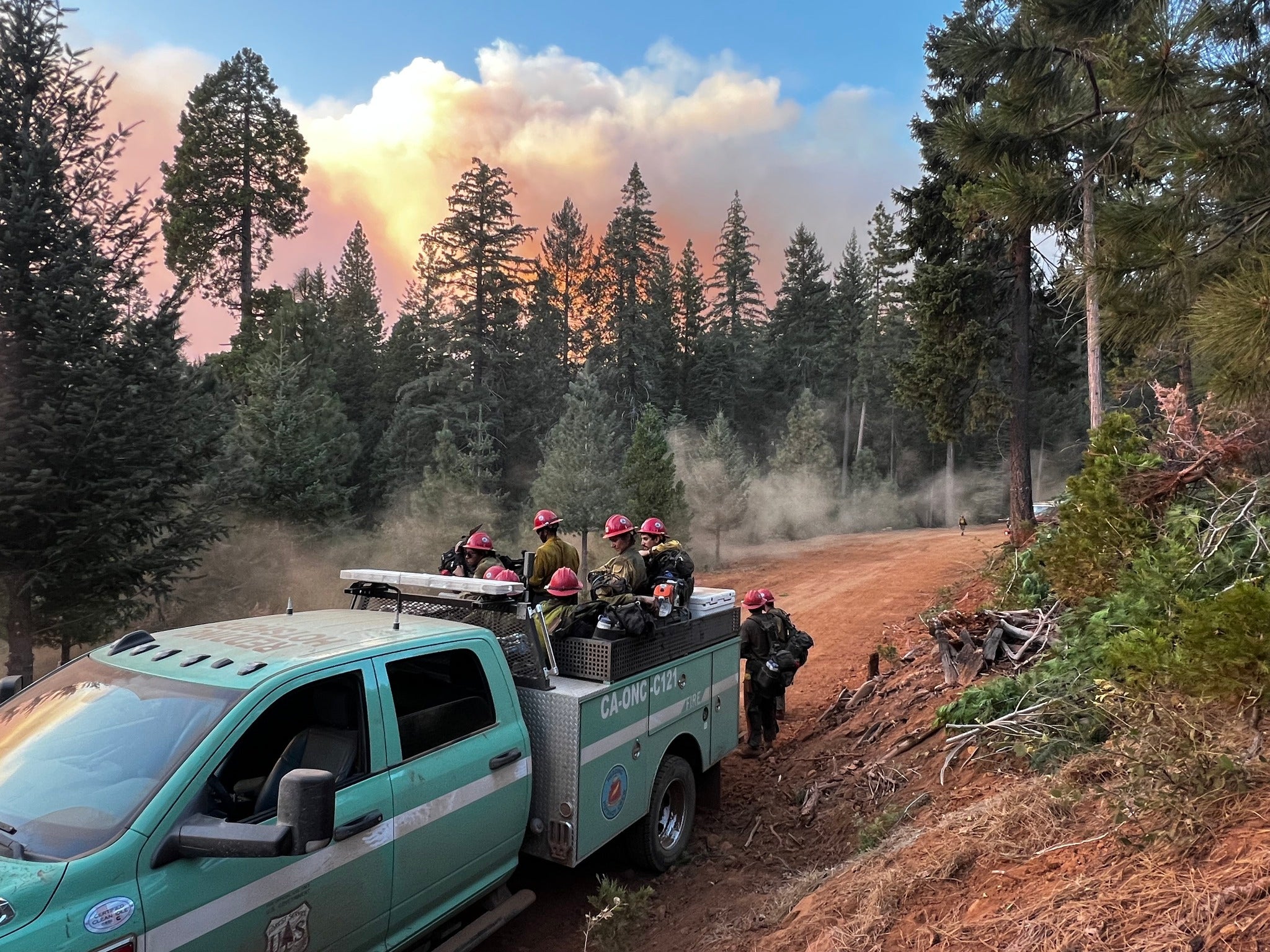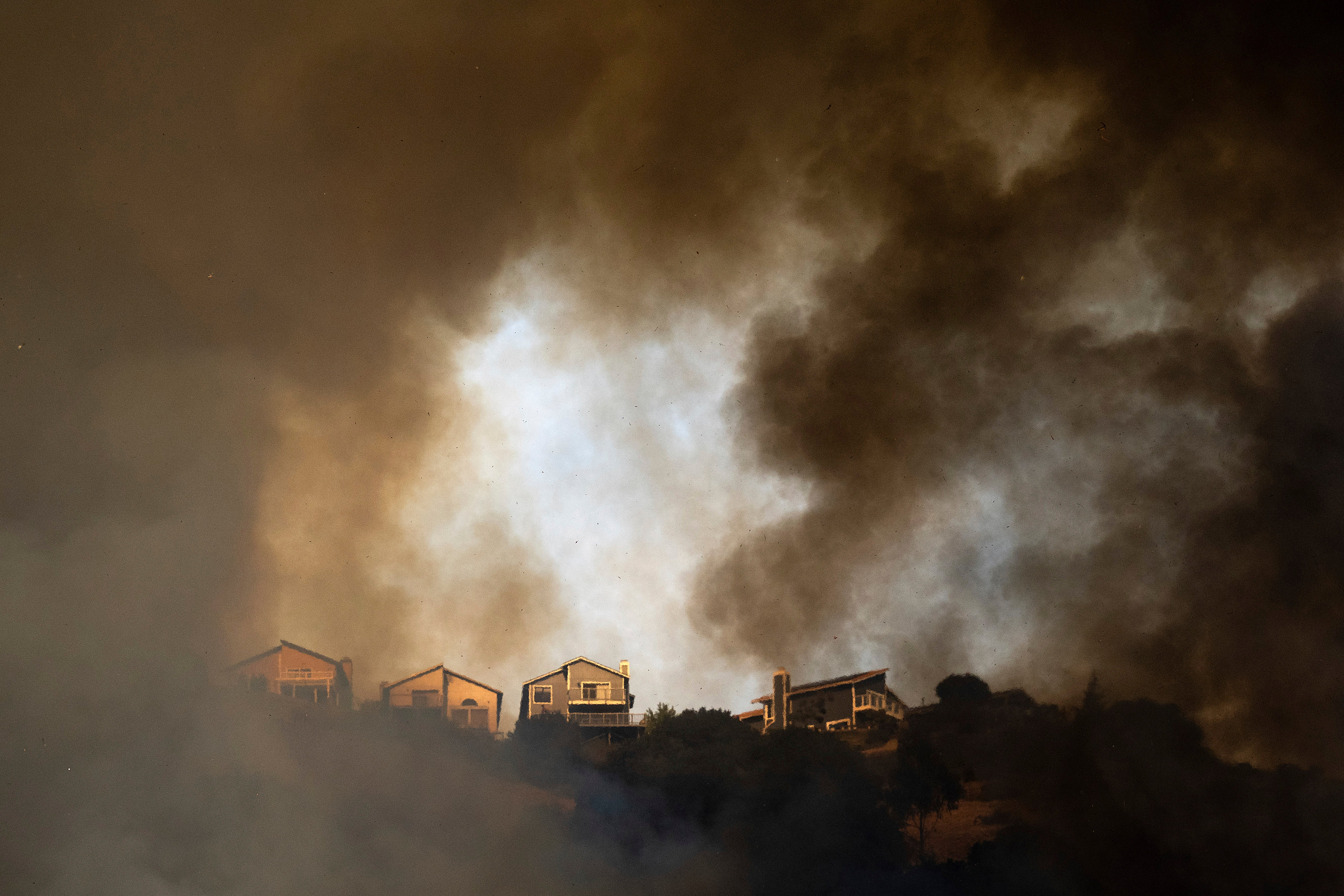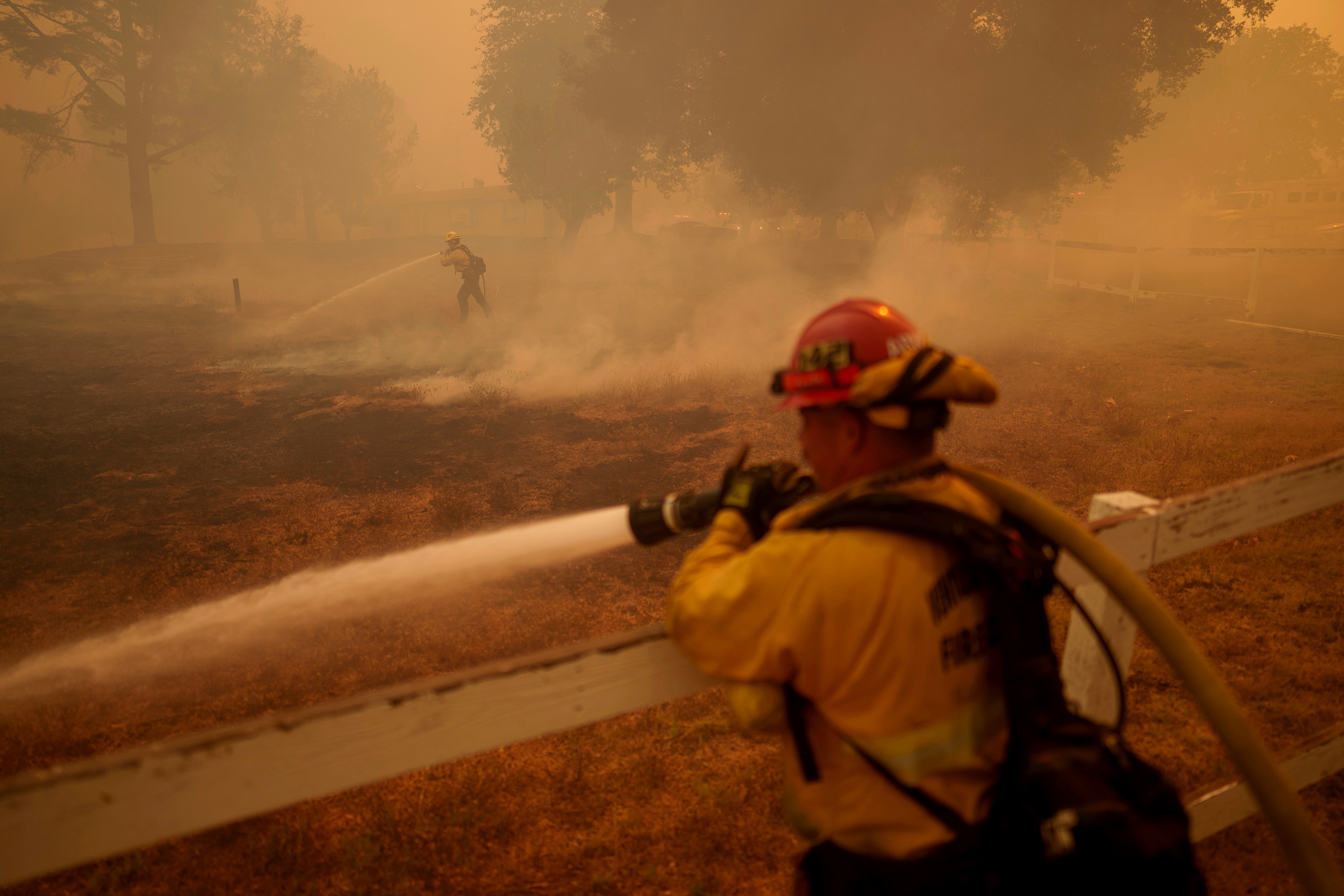Republicans blame California for wildfires — and ignore the role of the fossil fuel companies funding them
The production of fossil fuels is responsible for more extreme climate events that fuel vegetation growth — and wildfires

Your support helps us to tell the story
From reproductive rights to climate change to Big Tech, The Independent is on the ground when the story is developing. Whether it's investigating the financials of Elon Musk's pro-Trump PAC or producing our latest documentary, 'The A Word', which shines a light on the American women fighting for reproductive rights, we know how important it is to parse out the facts from the messaging.
At such a critical moment in US history, we need reporters on the ground. Your donation allows us to keep sending journalists to speak to both sides of the story.
The Independent is trusted by Americans across the entire political spectrum. And unlike many other quality news outlets, we choose not to lock Americans out of our reporting and analysis with paywalls. We believe quality journalism should be available to everyone, paid for by those who can afford it.
Your support makes all the difference.In October, former President Donald Trump took to a rally stage in California and told residents of the Democratic stronghold that he’d withhold federal wildfire aid if Governor Gavin Newsom refused to back his policies during a possible second term.
The very next day, Florida Republican Rep. Byron Donalds — who was once floated as a potential running mate for Trump — appeared on CNN’s State of the Union as his own state was still reeling from two powerful hurricanes that unleashed widespread flooding and left residents stranded for weeks.
When asked about Trump’s remarks, Donalds insisted California needs to do more “simple work” to prevent wildfires.
“I think when you look at Florida versus California, taking in hurricane-force winds and massive flooding is one thing. There’s not much the state of Florida can do to prevent that,” the congressman said, just days after Category 3 Milton made landfall. “You compare that with California’s environmental policy, a lot of their forest fires are mostly caused because the state of California blocks the management of their lands, they don’t clear the underbrush.”

Donalds, whose campaign has benefited from oil and gas interests, failed to note the impact that climate change has had on his own state and the wildfires regularly raging across California. Greenhouse gas emissions generated by fossil fuel production are powering extreme climate events that increase the risk of wildfires across California. A study from the Union of Concerned Scientists released last year found that 19.8 million acres of burned forest land in the US West and southwestern Canada can be attributed to emissions traced to the world’s 88 largest fossil fuel producers and cement manufacturers.
Donalds, who is running for re-election, has received tens of thousands of dollars from greenhouse gas-producing energy companies since his first election to Congress in 2020, Federal Election Commission records show. He’s also co-sponsored legislation that would prevent American presidents from declaring a climate emergency using three federal laws that give the executive branch additional powers in emergencies.
Meanwhile, Trump — whose mantra is “drill, baby, drill” — has reportedly received millions from oil and gas interests, including several high-profile billionaires. The New York Times reported he raked in more than $15 million from the leaders of three major fossil fuel companies.
Donalds did not reply to The Independent’s multiple requests for comment.
Fossil fuel emissions from the production of oil and gas have warmed the Earth’s atmosphere to nearly “uninhabitable” levels, scientists say. With the planet’s warming, climate events have become more extreme, including wildfires and hurricanes. Atmospheric river storms that have slammed California during recent winters have provided drought relief, while resulting in even more vegetation that could go up in smoke.

California saw a shorter spring as hotter temperatures started earlier in the year. Cal Fire’s Joshua Mott told The Independent that gave firefighters a brief window for prescribed fire and fuels reduction work before the fire season was in full swing.
Then, the Park Fire sparked when a man rolled a burning car into a gully near Chico last July. The fire, which became the state’s fourth-largest, only was fully contained by mid-October, amid windy and hot weather that has continued to plague the western US this fall.
The Forest Service said that, following the fire, it would continue to work to remove hazardous trees and clean up woody debris. Landscape that is catastrophically burned won’t grow back as the same type of forest that it was before. In one area, workers had previously ground up brush and left Lassen National Forest trees spaced out in an effort to reduce severe impacts. But, the Park Fire still burned “really hot” there.
The federal government has directed $930 million toward clearing trees and underbrush from western national forests last year, including in California. Agriculture Secretary Tom Vilsack acknowledged then that a shortage in workers was hindering efforts and said that Republican budget cuts could also harm the administration’s plans.
Reducing vegetation that fuels fires is a year-long process, some acres take more time and effort to treat than others due to their location or other environmental concerns. This fiscal year, state agency Cal Fire has treated more than 7,300 acres, undertaking 154 fuels reduction projects, from July 1 to the end of September. The state invests millions in funding for fuels reduction work through other departments and grants to local and non-profit organizations. Each year, approximately 500 active fuels reduction projects receive some level of treatment. Cal Fire, which covers 31 million of the state’s 100 million acres, has a budget of $4.2 billion for this fiscal year: a figure that’s approximately doubled from 2014.
“So really it’s, it’s kind of strategically targeting areas that might be or that have kind of been identified as being prone to wildfire,” Mott explained.

Over the past few decades, California has been forced to grapple with a harsh reality: climate change has made western wildfires more likely and severe. In the region, drought and extreme heat have made trees, shrubs, grasses, and forest debris even drier and doubled the number of large fires between 1984 and 2015.
This year, more than a million acres have burned due to 7,194 wildfires in the Golden State. Last year, NOAA found that 10 of the state’s largest wildfires started during the last two decades. Fires are also becoming faster, burning homes before firefighters have a chance to intervene. Meanwhile, Cal Fire has been carrying out a plan to combat the effects of climate change.
“And, we’ve kind of been working towards meeting the goals that that plan lays out. Because Cal Fire is treating 100,000 acres a year with 50,000 of those acres being prescribed fire. And then, the statewide total goal is treating a million acres per year,” he said.
Today’s hotter and larger wildfires are also burning healthy trees that could otherwise withstand smaller fires. In recent years, the Forest Service has already taken steps to incorporate prescribed burns and go after the underbrush — as Donalds suggested — although the practice can be risky. Prescribed fires that escaped firefighters’ control had devastating impacts on communities and natural resources in New Mexico two years ago, merging to become the state’s largest wildfire on record and damaging hundreds of structures.
Mott said a big part of the strategy for forest and wildfire resilience has been increasing the pace and scale of the use of prescribed fire across the state. “Not only is it ecologically beneficial to a lot of areas, a lot of plants ... but it’s also an effective way of reducing fuels on the landscape and reducing the potential for wildfire in specific areas,” he said.
But, with future climate change threats looming in the near distance, a return to traditional knowledge could prevent more and larger disasters.

State Senator Bill Dodd, who had to evacuate his Napa home due to wildfires in October 2017, said he’s proud of what has been accomplished in California. He noted that climate change isn’t a “one-and-done thing.”
He introduced legislation that acknowledges tribal sovereignty over cultural burning for the first time in California’s history.
“There’s a lot of people who complain we haven’t done enough. But let me tell you ... prior to climate change activity itself or manifesting itself in such horrible ways, we weren’t doing anything,” Dodd told The Independent. “So ... when you stop to consider since the 2017 fires ... we’ve gone from zero to 60 in four seconds. I’m really proud of the job they’ve done.”
Join our commenting forum
Join thought-provoking conversations, follow other Independent readers and see their replies
Comments